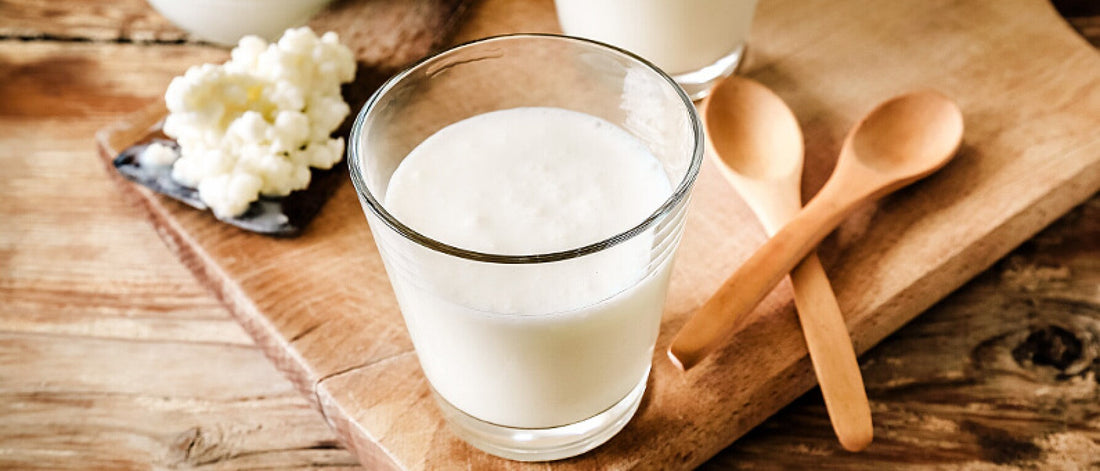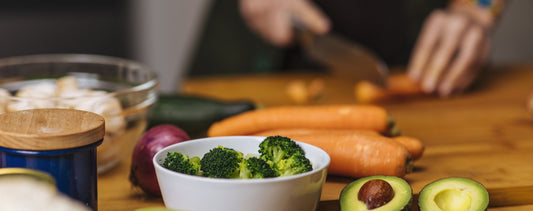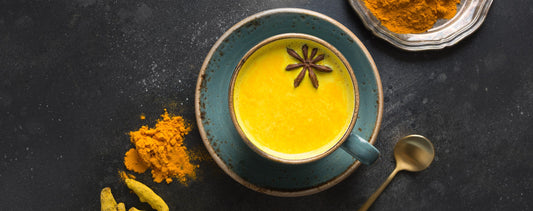Kefir is a traditional food, originating in Eastern Europe and Russia in the Caucasian mountains. Derived from the Turkish word keyif, which means “feeling good,” kefir became a tonic that was enjoyed beyond Eastern Europe.
A fermented drink, kefir is usually made from cow, goat, nut, or coconut milk. What makes kefir different from its cousin, yogurt, is the way in which it is made. Kefir is fermented with kefir grain—a combination probiotic bacteria and yeast. The kefir grains feed on the lactose in the milk, making it lower in lactose (if using cow or goat milk) and easier for those to digest who have lactose intolerance. When kefir is made with nut milk or coconut milk the process is similar except requires just a bit of sugar instead of the lactose (in the milk) for the fermentation to occur.
Its potent nutrient profile lends to its popularity and widespread uses for health and well-being. Kefir is especially high in vitamin B12, calcium, magnesium, vitamin K, folate, and a diverse array of probiotics.
The fermentation process enhances many of the health benefits of foods, due to the high and diverse range of probiotics and increased bioavailability. As a fermented beverage, kefir is a wonderful example of a probiotic superfood. Kefir benefits range from digestive support to immunity; it has earned its place as a hearty probiotic food you can include in your health regimen. The following are four of the main health benefits of Kefir:
While it may take a bit more effort to eat a diet rich in fermented foods such as kefir, it is well worth the effort for your gut health and overall wellness.
According to the NIDDK (National Institute of Diabetes and Digestive and Kidney Diseases, part of the National Institutes of Health [NIH]), 60 to 70 million people struggle with digestive issues in the U.S. Some of the common digestive issues include IBS (irritable bowel syndrome), IBD (inflammatory bowel disease), candida overgrowth, constipation, and Crohn’s Disease.
When your microbiome (the delicate ecology of microbes living in your gut) is well balanced, you experience a healthier digestive process. Research shows that symptoms such as bloating, diarrhea, and various forms of IBD improve with a diet high in probiotics. Foods high in probiotics have also been shown (in children) to repair candida overgrowth (an imbalance of yeast in the microbiome), help heal leaky gut syndrome, and decrease digestive inflammation.
Including kefir in your diet may be a way to improve and/or repair your digestive health.
Research has shown that probiotic-rich foods, such as kefir, elevate immune function through supporting the strength and integrity of the intestinal lining, keeping the bad bacteria from crossing into the bloodstream and, therefore, creating more overall health for the immune system.
A strong immune system is priceless when you seek to feel your best. Adding in a food like kefir is a wise choice for a strong immune system.
While many dermatologists recommend probiotic-rich foods, such as kefir, for skin health (especially acne) more research is needed in this area of study, to confirm exact protocols and treatment types.
One thing you can be sure of is probiotic foods such as kefir, are a great way to enhance your diet, support your digestion, and, hence, your skin health.
Try this one:
Add these tasty high potency ingredients to your blender and BLEND!
Try this:
Mix all of the ingredients in a blender. Let the dressing set in the refrigerator for 30 minutes to one hour.
Drizzle on your favorite mixed green salad or use for a vegetable dipping sauce.
Try this:
Melt 1 teaspoon coconut oil in a large non-stick pan over medium heat.
In a large bowl, whisk together eggs, kefir, and vanilla extract until well combined. Add cassava flour, sea salt, and baking powder and mix well. Sift in the coconut flour and mix again, making sure there are no lumps.
Drop 1/4 cup batter per pancake onto the heated pan. Allow to cook 3–4 minutes until the underside is golden brown and they start to fluff up, then flip and cook another 2–3 minutes. Repeat with remaining pancake batter, using a little coconut oil as needed for each batch.
Serve with fresh fruit, chopped nuts, and maple syrup, honey, or coconut cream.
Ingredients:
Place all the ingredients into your blender. Blend to desired consistency (sometimes chunky can be fun!).
Pour the mixture into popsicle holders and pop into your freezer for approximately eight hours. Serve and enjoy.
Ingredients:
In a large glass mason jar, mix together the kefir grains and the milk.
Cover with either a coffee filter or cheesecloth and secure with a rubber band.
Set on the countertop in a warm spot for approximately 24 hours. Note: This may take longer depending on the temperature in your kitchen. The kefir is ready (and cultured) when there is some thickening and a pleasant aroma.
Strain the remaining kefir grains from the finished kefir.
Store the finished kefir in the refrigerator.
You can re-use the kefir grains in a new batch of milk.
As you can see, aside from drinking kefir, it is a powerful health food, a tasty ingredient, and a fun-to-explore food to check out. Kefir has potent array of nutrients, a diverse culture of probiotics, and a tangy flavor, making kefir a smart and easy food to include in your diet. Next time you have the chance, give kefir a try!
*Editor’s Note: The information in this article is intended for your educational use only; does not necessarily reflect the opinions of the Chopra Center's Mind-Body Medical Group; and is not a substitute for professional medical advice, diagnosis, or treatment. Always seek the advice of your physician or other qualified health providers with any questions you may have regarding a medical condition and before undertaking any diet, supplement, fitness, or other health programs.
Discover Deepak Chopra’s secrets to stay energetic and balanced all year long with our self-paced online course, Secrets to Vibrant Health. Learn More.
What Is Kefir?
Kefir is a slightly more-liquid version of yogurt. Often recommended for its impressive probiotic levels, kefir both does well as a stand-alone fermented beverage as well as a main ingredient in many yummy recipes.A fermented drink, kefir is usually made from cow, goat, nut, or coconut milk. What makes kefir different from its cousin, yogurt, is the way in which it is made. Kefir is fermented with kefir grain—a combination probiotic bacteria and yeast. The kefir grains feed on the lactose in the milk, making it lower in lactose (if using cow or goat milk) and easier for those to digest who have lactose intolerance. When kefir is made with nut milk or coconut milk the process is similar except requires just a bit of sugar instead of the lactose (in the milk) for the fermentation to occur.
Its potent nutrient profile lends to its popularity and widespread uses for health and well-being. Kefir is especially high in vitamin B12, calcium, magnesium, vitamin K, folate, and a diverse array of probiotics.
The fermentation process enhances many of the health benefits of foods, due to the high and diverse range of probiotics and increased bioavailability. As a fermented beverage, kefir is a wonderful example of a probiotic superfood. Kefir benefits range from digestive support to immunity; it has earned its place as a hearty probiotic food you can include in your health regimen. The following are four of the main health benefits of Kefir:
1. Gut Health
Ancient and traditional diets were once primarily made up of homegrown food that grew in healthy probiotic-rich soil and were then often fermented for safekeeping—increasing the good bacteria people once naturally ate. Today’s typical foods are more processed and refined, and the soil is not as healthy.While it may take a bit more effort to eat a diet rich in fermented foods such as kefir, it is well worth the effort for your gut health and overall wellness.
According to the NIDDK (National Institute of Diabetes and Digestive and Kidney Diseases, part of the National Institutes of Health [NIH]), 60 to 70 million people struggle with digestive issues in the U.S. Some of the common digestive issues include IBS (irritable bowel syndrome), IBD (inflammatory bowel disease), candida overgrowth, constipation, and Crohn’s Disease.
When your microbiome (the delicate ecology of microbes living in your gut) is well balanced, you experience a healthier digestive process. Research shows that symptoms such as bloating, diarrhea, and various forms of IBD improve with a diet high in probiotics. Foods high in probiotics have also been shown (in children) to repair candida overgrowth (an imbalance of yeast in the microbiome), help heal leaky gut syndrome, and decrease digestive inflammation.
Including kefir in your diet may be a way to improve and/or repair your digestive health.
2. Bone Health
Research shows that kefir improves bone mass (in rats). As mentioned, kefir is a great source of calcium, magnesium, and vitamin K. These specific nutrients (especially when working together) are a wonderful way to ensure your bones are able to stay strong and healthy.- Calcium is a mineral that is often associated with bone health. While calcium is imperative in bone density and strength, an increase in calcium alone is not always enough to ensure a large increase in bone mass density.
- Magnesium is another mineral that is crucial for bone health. For example, magnesium deficiency has been shown to contribute to osteoporosis—a condition of weakened bone density. A diet high in magnesium is helpful in maintaining bone integrity.
- Vitamin K helps calcium transport and absorb into the bones. In fact, many mechanisms of bone metabolism are recognized to be reliant on vitamin K, including bone mineralization and calcium balance in the bones.
3. Immunity
Especially during cold and flu season, it is important to keep your immune system strong by sleeping more, taking extra vitamin C, washing your hands frequently, and eating foods rich in probiotics.Research has shown that probiotic-rich foods, such as kefir, elevate immune function through supporting the strength and integrity of the intestinal lining, keeping the bad bacteria from crossing into the bloodstream and, therefore, creating more overall health for the immune system.
A strong immune system is priceless when you seek to feel your best. Adding in a food like kefir is a wise choice for a strong immune system.
4. Skin Health
Your skin health is often said to be a reflection of your overall health. Radiant skin comes from a strong well of internal health –– including your digestion and your microbiome. Repairing skin issues is often influenced by diet along with a strong digestion and microbiome balance. Probiotic therapy can have a wonderful impact on many common skin issues.While many dermatologists recommend probiotic-rich foods, such as kefir, for skin health (especially acne) more research is needed in this area of study, to confirm exact protocols and treatment types.
One thing you can be sure of is probiotic foods such as kefir, are a great way to enhance your diet, support your digestion, and, hence, your skin health.
How to Incorporate Kefir into Your Diet
You may have enjoyed a swig of kefir from your local health food store or even tried it at one of your favorite restaurants in a tasty sauce or dressing. Getting comfortable with the many uses of kefir is a sure way to increase your appetite for this versatile food. Check out a few simple ways to explore kefir in your meals and benefit from this source of probiotics.1. Drink Smoothies with Kefir
Try adding kefir as a protein and probiotic boost to your morning smoothie. Kefir adds a tangy and bright flavor to almost any smoothie profile.Try this one:
Green Goddess Smoothie
Ingredients:- 1/2 banana
- 1/2 avocado
- 2 leaves of romaine lettuce
- 2 large kale leaves (de-stemmed)
- 1 handful baby spinach
- 1/4 cup broccoli sprouts
- 1/2 cucumber, peeled and sliced
- 16 oz coconut water
- 1/2 cup kefir
- Squeeze of lime (to taste)
- Ice (optional)
Add these tasty high potency ingredients to your blender and BLEND!
2. Make Your Own Salad Dressing with Kefir
Do you like a creamy salad dressing? Just as yogurt can accentuate the creamy (and slightly sour) properties of many dressings, so can kefir. With its slightly more liquid consistency, kefir can act as a great base to explore in dressings and sauces.Try this:
Probiotic Avocado Ranch Dressing
Ingredients:- 2 cups kefir
- 1/2 avocado
- 3 teaspoons chopped parsley
- 1 tablespoon lemon juice
- 1 clove fresh garlic
- 1 teaspoon chopped fresh chives
- 1 teaspoon garlic powder
- Sea salt to taste
- 1/2 teaspoon black pepper
Mix all of the ingredients in a blender. Let the dressing set in the refrigerator for 30 minutes to one hour.
Drizzle on your favorite mixed green salad or use for a vegetable dipping sauce.
3. Substitute Buttermilk with Kefir
You may agree that there is nothing like the homemade taste of buttermilk, but kefir is a wonderful and tasty substitution. Kefir has a similar consistency, flavor, and reaction in traditional baking, helping the dough or batter rise.Try this:
Kefir Paleo Pancakes
Ingredients:- 2–3 teaspoons coconut oil
- 4 eggs
- 1 cup kefir
- 2 teaspoons vanilla extract
- 2/3 cup cassava flour
- 2 tablespoons coconut flour
- 1/4 teaspoon sea salt
- 1/2 teaspoon baking powder
- 2 cups fruit of choice to top
- 1/4 cup walnuts or pecans, chopped (optional)
Melt 1 teaspoon coconut oil in a large non-stick pan over medium heat.
In a large bowl, whisk together eggs, kefir, and vanilla extract until well combined. Add cassava flour, sea salt, and baking powder and mix well. Sift in the coconut flour and mix again, making sure there are no lumps.
Drop 1/4 cup batter per pancake onto the heated pan. Allow to cook 3–4 minutes until the underside is golden brown and they start to fluff up, then flip and cook another 2–3 minutes. Repeat with remaining pancake batter, using a little coconut oil as needed for each batch.
Serve with fresh fruit, chopped nuts, and maple syrup, honey, or coconut cream.
Probiotic Popsicles
Need a little sweet treat this summer? Try these simple kefir popsicles. You can play with your favorite fruit combinations (it’s hard to go wrong) and delight in a healthy, sweet, and probiotic-rich summertime treat.Ingredients:
- 3 cups kefir
- 1 cup frozen fruit
- 1/2 cup raw honey
Place all the ingredients into your blender. Blend to desired consistency (sometimes chunky can be fun!).
Pour the mixture into popsicle holders and pop into your freezer for approximately eight hours. Serve and enjoy.
Make Your Own Kefir
Making your own kefir may sound daunting, but it is actually about as easy as fermenting gets. Follow the instructions below and give it a go.Ingredients:
- 1–2 teaspoons of active kefir grains
- 4 cups milk of choice
In a large glass mason jar, mix together the kefir grains and the milk.
Cover with either a coffee filter or cheesecloth and secure with a rubber band.
Set on the countertop in a warm spot for approximately 24 hours. Note: This may take longer depending on the temperature in your kitchen. The kefir is ready (and cultured) when there is some thickening and a pleasant aroma.
Strain the remaining kefir grains from the finished kefir.
Store the finished kefir in the refrigerator.
You can re-use the kefir grains in a new batch of milk.
As you can see, aside from drinking kefir, it is a powerful health food, a tasty ingredient, and a fun-to-explore food to check out. Kefir has potent array of nutrients, a diverse culture of probiotics, and a tangy flavor, making kefir a smart and easy food to include in your diet. Next time you have the chance, give kefir a try!
*Editor’s Note: The information in this article is intended for your educational use only; does not necessarily reflect the opinions of the Chopra Center's Mind-Body Medical Group; and is not a substitute for professional medical advice, diagnosis, or treatment. Always seek the advice of your physician or other qualified health providers with any questions you may have regarding a medical condition and before undertaking any diet, supplement, fitness, or other health programs.
Discover Deepak Chopra’s secrets to stay energetic and balanced all year long with our self-paced online course, Secrets to Vibrant Health. Learn More.






















